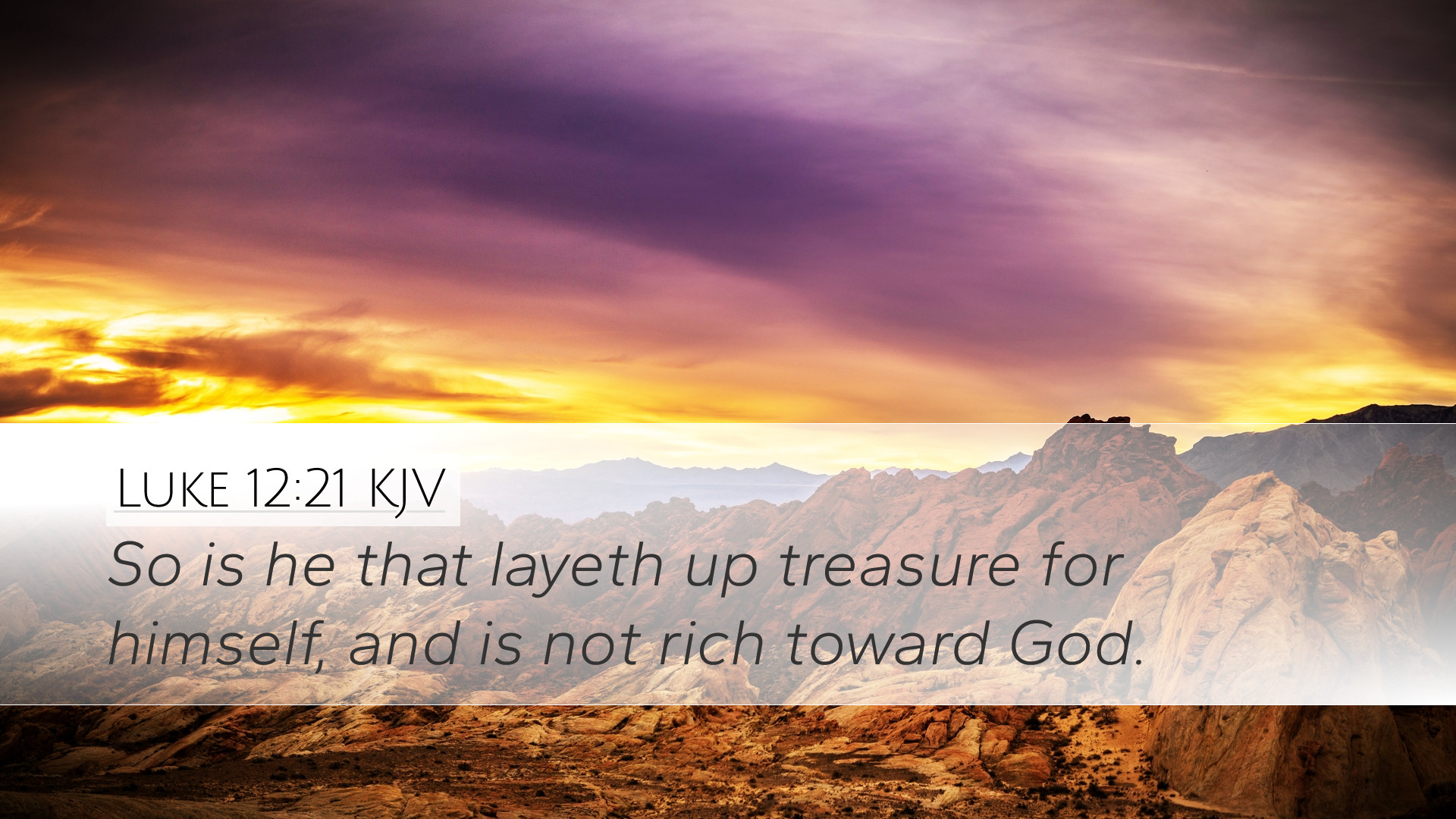Commentary on Luke 12:21
Luke 12:21 states:
“So is he that layeth up treasure for himself, and is not rich toward God.”
Introduction
This verse comes as the climax of a parable told by Jesus regarding the foolish rich man who amassed wealth only to face death without spiritual riches. It provides a profound lesson on the nature of true wealth and addresses the priorities of life that define one's relationship with God.
Context and Analysis
The verse is situated within a broader discourse where Jesus instructs His followers on issues of greed, materialism, and spiritual prioritization. The parable introduces a man who, after a bountiful harvest, decides to tear down his barns to build larger ones, emphasizing a self-centered approach to wealth.
Matthew Henry comments that the heart of the folly of the rich man lay in his focus on earthly possessions rather than spiritual wealth. He states that the man is foolish not because of having wealth, but because he hoards it for himself, ignoring the needs of the community and the call to generosity.
The Foolishness of Hoarding
According to Albert Barnes, Jesus emphasizes a critical truth: preparing for an earthly future at the expense of one’s spiritual standing is where true foolishness lies. The man in the parable thinks he can secure his life through abundance, missing the insight that life is fleeting and uncertain.
- Earthly possessions are transient: Jesus indicates that material wealth cannot shield one from mortality.
- True life and security are found in God: Spiritual wealth lasts and fulfills the deeper needs of existence.
The Call to Be Rich Toward God
Jesus contrasts the foolish man with the ideal life, emphasizing the importance of being "rich toward God." Adam Clarke elaborates on this by stating that being rich toward God involves using one's resources, time, and abilities for divine purposes. This commitment is expressed through acts of charity, love, and service to others.
Being rich in God entails:
- Investing in eternal treasures: Matthew 6:19-21 encourages believers to store treasures in heaven, where they are secure.
- Living generously: Sharing with the poor and supporting the work of the kingdom are fundamentals of a spiritually wealthy life.
Theological Implications
This verse reveals significant theological themes, including the nature of God’s kingdom and the contrast between human and divine values. It stresses the necessity of aligning one’s priorities with God’s eternal perspective.
- Temporal vs. Eternal: The misplacement of priorities is a recurring theme in Scripture; followers of Christ must seek first the kingdom of God (Matthew 6:33).
- Moral Responsibility: Christians are called to be stewards of what God has entrusted to them, understanding that everything belongs to Him.
Practical Applications
For pastors, students, and theologians, Luke 12:21 serves as a vital text in preaching and teaching about stewardship and discipleship. Here are some practical implications:
- Encourage Generosity: Teach congregations the importance of generosity as a reflection of a heart rich toward God.
- Challenge Materialism: Use this passage to confront the prevailing culture of consumerism that prioritizes material gain over spiritual health.
- Emphasize Community Needs: Highlight the role of the church in addressing social issues and supporting one another in faith and practice.
Concluding Thoughts
In conclusion, Luke 12:21 serves as a poignant reminder of the dangers of the pursuit of wealth without God. The teachings of Jesus call individuals to reflect on their lives and question what constitutes true riches. As believers remain mindful of being 'rich toward God', they embrace a life filled with purpose, service, and eternal significance.


